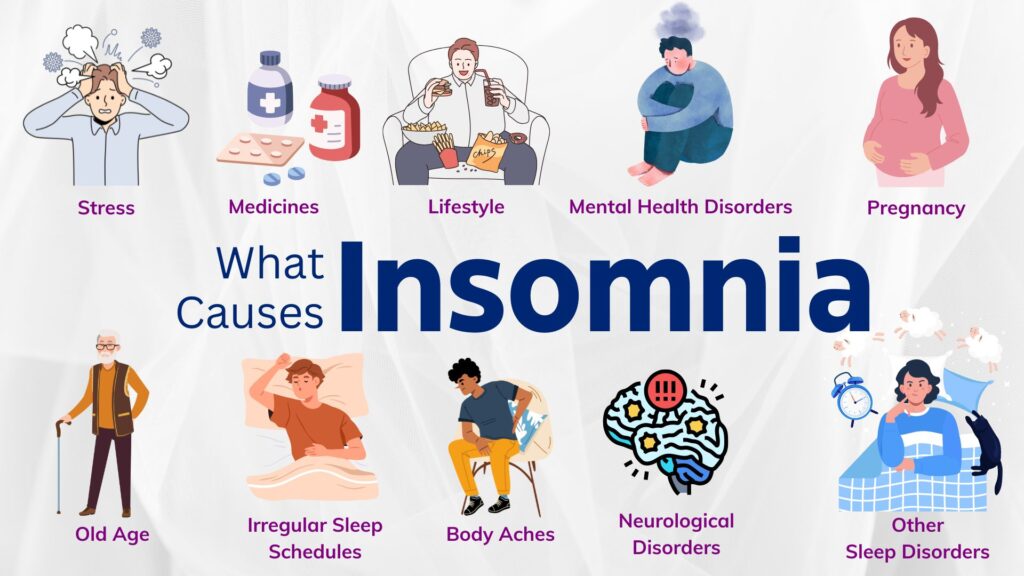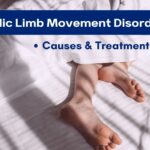Insomnia is a sleep disorder characterized by difficulty falling asleep, staying asleep, or experiencing non-restorative sleep, despite having adequate opportunities for sleep. It is a common condition affecting people of all ages and can have significant repercussions on physical health, mental well-being, and overall quality of life.
Understanding insomnia is crucial due to its widespread prevalence and its impact on individuals’ daily functioning. In this article, we will delve into the various aspects of insomnia, including its types, causes, effects, diagnosis, treatment options, and coping strategies.
Types of Insomnia
Insomnia can manifest in different forms, each with its own characteristics and underlying causes. Understanding these types is essential for accurate diagnosis and effective management.
1. Primary Insomnia:
- Definition: Primary insomnia refers to sleep difficulties that are not directly associated with any other medical condition or substance use.
- Characteristics: Individuals with primary insomnia often experience persistent difficulties falling asleep or staying asleep, leading to daytime impairment.
- Causes: The exact cause of primary insomnia is not always clear but may involve factors such as psychological stress, poor sleep habits, or hyperarousal of the central nervous system.
2. Secondary Insomnia:
- Definition: Secondary insomnia occurs as a result of underlying medical conditions, psychiatric disorders, or substance use.
- Characteristics: Sleep disturbances in secondary insomnia are often linked to the underlying condition or medication side effects.
- Causes: Secondary insomnia can be triggered by various factors, including chronic pain conditions (e.g., arthritis), mental health disorders (e.g., depression, anxiety), sleep-related breathing disorders (e.g., sleep apnea), or the use of certain medications or substances (e.g., caffeine, alcohol, stimulants).
3. Acute vs. Chronic Insomnia:
- Acute Insomnia: Acute insomnia is short-term and typically lasts for a few days or weeks. It is often triggered by stressful life events, changes in environment or routine, or transient factors such as jet lag.
- Chronic Insomnia: Chronic insomnia persists for a longer duration, typically occurring at least three nights per week for three months or more. It may stem from underlying medical or psychiatric conditions, lifestyle factors, or a combination of factors.
Causes of Insomnia
Insomnia can arise from various factors, ranging from psychological and medical conditions to lifestyle choices and environmental influences. Identifying these underlying causes is essential for effective management and treatment of the disorder.

Psychological Factors:
- Stress: High levels of stress, whether related to work, relationships, or personal concerns, can disrupt sleep patterns and contribute to insomnia.
- Anxiety: Persistent feelings of anxiety or worry can lead to difficulty falling asleep or staying asleep, perpetuating a cycle of sleeplessness.
- Depression: Depression is closely linked with insomnia, as both conditions often coexist and exacerbate one another. Sleep disturbances are a common symptom of depression, and addressing sleep problems is integral to managing depressive symptoms.
Medical Conditions:
- Sleep Disorders: Conditions such as obstructive sleep apnea, restless leg syndrome, and periodic limb movement disorder can disrupt sleep architecture and lead to insomnia.
- Chronic Pain: Pain conditions, such as arthritis or fibromyalgia, can make it difficult to find a comfortable sleeping position and maintain restful sleep throughout the night.
- Neurological Disorders: Neurological conditions, including Parkinson’s disease and Alzheimer’s disease, may disrupt sleep-wake cycles and contribute to insomnia symptoms.
Lifestyle Factors:
- Poor Sleep Habits: Irregular sleep schedules, excessive napping during the day, and inconsistent bedtime routines can disrupt the body’s natural circadian rhythm and contribute to insomnia.
- Stimulant Use: Consumption of stimulants such as caffeine, nicotine, and certain medications (e.g., decongestants, antidepressants) can interfere with sleep onset and quality.
- Alcohol and Substance Use: While alcohol may initially induce drowsiness, it can disrupt sleep patterns and lead to fragmented sleep later in the night. Similarly, the use of certain recreational drugs can impair sleep quality and exacerbate insomnia symptoms.
4. Environmental Factors:
- Noise and Light Exposure: Environmental factors such as excessive noise, bright lights, or uncomfortable room temperature can interfere with sleep and contribute to insomnia.
- Shift Work: Irregular work schedules, particularly night shifts, can disrupt the body’s internal clock and lead to insomnia symptoms due to alterations in sleep-wake patterns.
Effects of Insomnia
Insomnia can have profound effects on both physical and mental health, as well as overall quality of life.
Impact on Physical Health:
- Increased Risk of Chronic Diseases: Chronic insomnia is associated with an elevated risk of developing various medical conditions, including cardiovascular diseases (e.g., hypertension, heart diseases including heart attacks), metabolic disorders (e.g., diabetes), and obesity.
- Weakened Immune Function: Sleep plays a vital role in immune function, and chronic sleep deprivation resulting from insomnia can compromise the body’s ability to fight off infections and illnesses.
- Altered Pain Perception: Insomnia can heighten pain sensitivity, exacerbating existing pain conditions and reducing pain tolerance.
Impact on Mental Health:
- Increased Risk of Mood Disorders: Insomnia is closely linked with mood disorders such as depression and anxiety. Sleep disturbances can exacerbate symptoms of these conditions and contribute to a vicious cycle of poor sleep and worsened mental health.
- Impaired Cognitive Function: Sleep deprivation resulting from insomnia can impair cognitive function, including memory, attention, concentration, and decision-making abilities. This can impact performance at work or school and increase the risk of accidents.
- Emotional Dysregulation: Sleep deprivation can lead to heightened emotional reactivity and reduced emotional regulation, making individuals more prone to irritability, mood swings, and emotional instability.
Impaired Functioning and Quality of Life:
- Daytime Fatigue and Sleepiness: Persistent sleep disturbances can result in excessive daytime sleepiness, fatigue, and reduced alertness, impairing performance in daily activities and increasing the risk of accidents, particularly while driving or operating machinery.
- Impaired Social and Interpersonal Functioning: Insomnia can strain relationships and social interactions due to irritability, moodiness, and reduced engagement in social activities.
- Decreased Quality of Life: Chronic insomnia can significantly diminish overall quality of life, impacting physical health, mental well-being, social relationships, and daily functioning.
Diagnosis of Insomnia
Accurate diagnosis of insomnia involves a comprehensive evaluation of sleep patterns, medical history, and potential contributing factors. At SOLVEMyHealth, we use several tools and criteria, that are scientifically proven and tested, to assess and diagnose insomnia effectively.
Also Read: Understanding Snoring & Sleep Apnea
Clinical Evaluation and History-Taking: At SOLVEMyHealth, we begin our diagnostic process by conducting a thorough evaluation and obtaining a detailed history of your sleep patterns, sleep-related symptoms, medical history, medication use, and lifestyle factors. Specific attention is also paid to the frequency, duration, and severity of sleep disturbances, as well as any associated daytime impairments or functional difficulties. Additional tests including a home-based sleep study, and consultation with one of our doctors – neurologist, psychiatrist, psychologist, or pulmonologist may be suggested for further evaluation.
Sleep Diary and Assessment Tools: Sleep diaries can be valuable tools for tracking sleep-wake patterns and identifying patterns of insomnia over time. Recording bedtime, wake time, sleep latency (time taken to fall asleep), wake after sleep onset (WASO), and subjective sleep quality on a nightly basis may be useful for assessing sleep. However, these approaches may vary based on the reason and underlying cause of sleep disorder. Additionally, standardized assessment tools, such as the Pittsburgh Sleep Quality Index (PSQI) or the Insomnia Severity Index (ISI), may be used to assess the severity of insomnia symptoms and their impact on daily functioning.
The Diagnostic and Statistical Manual of Mental Disorders, Fifth Edition (DSM-5), provides criteria for diagnosing insomnia disorder based on specific symptomatology and duration. According to DSM-5 criteria, the diagnosis of insomnia disorder requires the presence of predominant complaints of dissatisfaction with sleep quantity or quality, associated with difficulty initiating or maintaining sleep, occurring at least three nights per week for a duration of at least three months, and causing significant distress or impairment in daytime functioning. At SOLVEMyHealth, we offer resources and information, empower you to manage sleep disorders, thereby improving your health and well-being.
It is essential to differentiate insomnia from other sleep disorders, medical conditions, psychiatric disorders, or medication side effects that may contribute to sleep disturbances. Common differential diagnoses include sleep apnea, restless leg syndrome, circadian rhythm disorders, mood disorders (e.g., depression, anxiety), and chronic pain conditions.
Also Read: Narcolepsy & its impact on sleep
In complex cases or when initial interventions are not effective, referral to sleep specialists or sleep clinics may be warranted for further evaluation, polysomnography (sleep study), or specialized treatment modalities. By employing a systematic approach to diagnosis, at SOLVEMyHealth, we accurately identify and assess insomnia, allowing for the implementation of targeted interventions and personalized treatment plans tailored to your specific needs and circumstances.
Treatment & Management of Insomnia
Addressing insomnia often requires a multifaceted approach that encompasses both non-pharmacological and pharmacological interventions
Non-pharmacological Approaches:
- Cognitive Behavioral Therapy for Insomnia (CBT-I): CBT-I is a structured, evidence-based therapy aimed at modifying dysfunctional thoughts and behaviours related to sleep. It includes techniques such as sleep restriction, stimulus control, relaxation training, and cognitive restructuring to promote healthy sleep habits and improve sleep quality. At SOLVEMyHealth, we provide CBT sessions to our clients to manage sleep disorders.
- Sleep Hygiene Practices: Establishing a regular sleep schedule, creating a comfortable sleep environment, avoiding stimulating activities before bedtime, and limiting exposure to screens and electronic devices can optimize sleep hygiene and facilitate restful sleep.
- Relaxation Techniques: Relaxation exercises, such as progressive muscle relaxation (JPMR), deep breathing exercises, and mindfulness meditation, can promote relaxation and reduce stress and anxiety levels, facilitating sleep onset and maintenance.
- Stimulus Control Therapy: This behavioural intervention involves associating the bed and bedroom with sleep and implementing strategies to minimize sleep-disrupting stimuli, such as limiting activities in bed to sleep and sex only.
Pharmacological Interventions:
- Prescription Medications: In certain cases, healthcare providers may prescribe medications to help manage insomnia symptoms. Commonly prescribed medications for insomnia include benzodiazepines, non-benzodiazepine hypnotics (e.g., zolpidem, eszopiclone), and sedating antidepressants. However, these medications are typically used for short-term management due to the risk of tolerance, dependence, and adverse effects.
- Over-the-Counter Options: Some individuals may find relief from mild insomnia symptoms with over-the-counter sleep aids, such as diphenhydramine or doxylamine. However, these medications should be used cautiously and under the guidance of a healthcare provider, as they can cause drowsiness and carry potential risks and side effects.
- Herbal Remedies and Supplements: Melatonin supplements are commonly used as natural sleep aids.
Lifestyle Changes for Insomnia
In addition to formal treatment approaches, adopting certain lifestyle modifications can play a significant role in improving sleep quality and managing insomnia symptoms. These adjustments will promote healthy sleep habits and create an environment conducive to restful sleep
Maintaining a healthy weight through balanced nutrition and regular physical activity can positively impact sleep quality and reduce the risk of sleep disorders, including insomnia. Regular physical activity can improve sleep quality and duration by reducing stress, anxiety, and promoting relaxation. Engaging in moderate to intense aerobic exercise, such as jogging, weight training, and cycling, during the day can enhance overall well-being and contribute to better sleep at night. However, it is essential to avoid vigorous exercise close to bedtime, as it may have stimulating effects that interfere with sleep.
Adopting a diet rich in fruits, vegetables, whole grains, and lean proteins while minimizing intake of processed foods, sugary snacks, and caffeine can support overall health and promote restful sleep. Excess weight, particularly abdominal obesity, is associated with an increased risk of sleep apnea and other sleep-related breathing disorders, which can disrupt sleep architecture and contribute to insomnia symptoms. Losing weight through a combination of dietary modifications and increased physical activity may help alleviate these sleep disturbances and improve sleep quality.
Additionally, certain foods and beverages, such as caffeine, alcohol, spicy foods, and heavy meals close to bedtime, can interfere with sleep onset and disrupt sleep continuity. Limiting the consumption of these substances, especially in the evening hours, can promote better sleep hygiene and support healthy sleep habits.
Stress management techniques, such as mindfulness meditation, deep breathing exercises, and progressive muscle relaxation, can help reduce stress levels and promote relaxation, making it easier to fall asleep and stay asleep. Going to bed and waking up at the same time every day, even on weekends, helps regulate the body’s internal clock and to promote consistency in sleep-wake patterns. Consistency is key in optimizing sleep quality and reducing the likelihood of insomnia. Designating the bedroom as a comfortable and relaxing sleep environment can facilitate restful sleep. This involves keeping the room cool, dark, and quiet, investing in a comfortable mattress and pillows, and minimizing disruptions such as noise and light. Exposure to screens emitting blue light, such as smartphones, tablets, and computers, can interfere with the body’s natural production of melatonin, a hormone that regulates sleep-wake cycles. Limiting screen time and engaging in relaxing activities, such as reading or listening to calming music, before bedtime can promote relaxation and prepare the body for sleep.
Conclusion
Insomnia is a common sleep disorder that can have significant impacts on physical health, mental well-being, and overall quality of life. Understanding the causes, effects, and treatment options for insomnia is essential for effectively managing this condition and improving sleep quality. From lifestyle modifications and behavioural interventions to seeking professional help and employing coping strategies, there are various approaches individuals can take to address insomnia and promote restful sleep. By consistently implementing these strategies and seeking support when needed, individuals can take proactive steps to improve their sleep health and overall well-being.
It is important to recognize that managing insomnia may require patience and persistence, as it often involves trial and error to find the most effective treatment approach for each individual. Additionally, leveraging resources such as SOLVEMyHealth’s integrated platform can provide valuable support and guidance throughout the journey of managing insomnia.
Ultimately, prioritizing sleep and adopting healthy sleep habits are integral to achieving optimal health and vitality. By taking proactive steps to address insomnia, individuals can experience improved sleep quality, enhanced daytime functioning, and a greater sense of well-being in their daily lives.











3 comments
Read Post
[…] Also Read: Insomnia – Treatment & Management […]
[…] Insomnia: Insomnia is characterized by difficulty falling asleep or staying asleep, leading to inadequate sleep duration and poor sleep quality. It can be acute (short-term) or chronic (long-term) insomnia. Read more on Insomnia – Click here […]